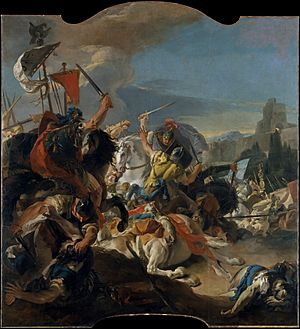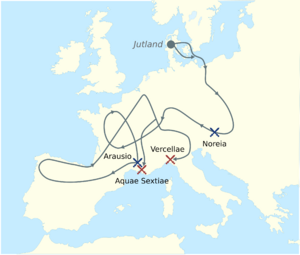Boiorix facts for kids
Quick facts for kids
Boiorix
|
|
|---|---|
| Died |
30 July 101 BC
|
| Title | King |
| Military career | |
| Allegiance | Cimbri |
| Battles/wars | Cimbrian War † |
Boiorix was a brave king of the Cimbri, an ancient tribe. He led his people to a huge victory against the Romans at the Battle of Arausio in 105 BC. This was one of Rome's worst defeats ever! Sadly, he died fighting bravely at the Battle of Vercellae in 101 BC.
Contents
Who Was Boiorix?
Boiorix was a powerful leader of the Cimbri tribe. His name might have come from the Celtic language. It could mean "King of the Boii" or "King of Strikers." This suggests he was a strong and important figure among his people.
The Cimbri's Big Journey
The Cimbri, along with another tribe called the Teutones, left their homes. These homes were near the Baltic Sea in a place called Jutland (which is now part of Scandinavia). They started their journey between 120 and 115 BC. No one is quite sure why they left.
First Fights with Rome
Boiorix and his people first met the Roman armies around 113 BC. This happened at the Battle of Noreia. The Roman leader, Gnaeus Papirius Carbo, told the Cimbri to leave. They agreed, but Carbo secretly planned to attack them.
The Cimbri found out about his trick. They attacked the Roman army and won a big victory! Only a few thousand Roman soldiers managed to escape.
The Battle of Arausio
After this, the Cimbri moved into Gaul (modern-day France). In 105 BC, they met two large Roman armies near a town called Arausio. The Roman leaders, Gnaeus Mallius Maximus and Quintus Servilius Caepio, did not work together.
Boiorix led his Cimbri warriors and the Teutones against the Romans. They first defeated a Roman general named Marcus Aurelius Scaurus. Scaurus was captured and brought before Boiorix. He bravely told Boiorix to leave Italy. But Boiorix was angry and had Scaurus executed.
Because the Roman armies were separated, Boiorix and King Teutobod of the Teutones could fight each Roman army one by one. They completely destroyed both Roman forces. It's said that about 80,000 Roman soldiers were killed. This was a massive win for Boiorix and his tribes!
Moving Towards Italy
After their huge victory, the Cimbri and Teutones did not march straight into Italy. Instead, they went southwest, trying to cross the Pyrenees mountains into Hispania (modern-day Spain). But the local tribes there fought them off.
By 104 BC, Boiorix and his forces decided to head towards Italy. The Cimbri separated from the Ambrones and Teutones. They crossed the Alps mountains near Noricum, arriving at Tridentum.
The Fight at Tridentum
In 102 BC, Boiorix's army met the Roman army led by Quintus Lutatius Catulus at the Battle of Tridentum. Catulus tried to use the narrow valley to his advantage. He also built a bridge across the Athesis River.
But Boiorix and his warriors were very strong. They slid down the snowy mountains on their shields! They then started to break the Roman bridge. Catulus had to order his army to retreat quickly. A brave Roman soldier, Gnaeus Petreius Atinas, held off the Cimbri long enough for the Romans to escape.
After this, Boiorix and the Cimbri spread out across the Po Valley. They took advantage of the lack of Roman defenders to gather supplies from the land. Meanwhile, Boiorix's allies, the Teutones and Ambrones, were defeated by the Roman general Gaius Marius at the Battle of Aquae Sextiae in 102 BC.

The Final Battle at Vercellae
In 101 BC, Boiorix continued to move through the Po Valley. He was probably hoping to meet up with the Teutones and Ambrones. The Roman generals Marius and Catulus wanted to fight him.
Boiorix challenged Marius to pick a time and place for a big battle. Marius agreed and chose a plain near Vercellae. On July 30, 101 BC, the Cimbri and Romans met for the Battle of Vercellae.
Marius used clever tactics, his well-trained soldiers, and strong cavalry. He and Catulus worked together to completely defeat the Cimbri. Most of Boiorix's army, including many civilians, were killed or captured. Boiorix himself died fighting bravely in the battle.
Historians say that those who died in the battle, like Boiorix, were lucky. Many others were captured and sold as slaves.
 | Madam C. J. Walker |
 | Janet Emerson Bashen |
 | Annie Turnbo Malone |
 | Maggie L. Walker |


